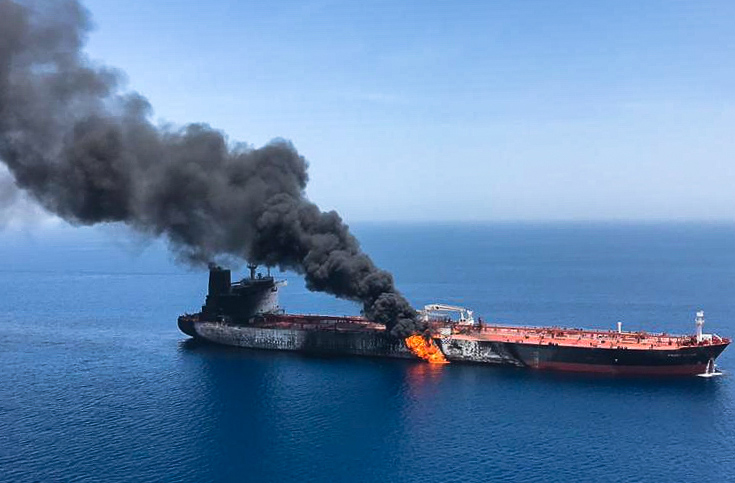Two tankers attacked in the Gulf of Oman as tensions rise
Peace in the region is at stake, with each side blaming each other for the aggression


A free daily email with the biggest news stories of the day – and the best features from TheWeek.com
You are now subscribed
Your newsletter sign-up was successful
Two oil tankers were attacked and abandoned in the waters between Iran and the Arabian peninsula yesterday, increasing volatility in a region already strained by violence and bellicose rhetoric, and causing oil prices to surge.
Investigations are ongoing, but varied reports suggest the Japanese-owned tanker Kokuka Courageous - which was hit twice - and the Norwegian Front Altair, were struck by torpedoes shells, or magnetic mines, causing their crews to leave them adrift.
The Iranian Navy rescued both crews. The US Navy Fifth Fleet, based in Bahrain, said it receiving distress calls and assisted the two tankers.
The Week
Escape your echo chamber. Get the facts behind the news, plus analysis from multiple perspectives.

Sign up for The Week's Free Newsletters
From our morning news briefing to a weekly Good News Newsletter, get the best of The Week delivered directly to your inbox.
From our morning news briefing to a weekly Good News Newsletter, get the best of The Week delivered directly to your inbox.
Late yesterday, US Secretary of State Mike Pompeo blamed Iran for the attacks. “Iran is lashing out because the regime wants our successful maximum pressure campaign lifted,” he said. “No economic sanctions entitle the Islamic Republic to attack innocent civilians, disrupt global oil markets, and engage in nuclear blackmail.”
Paolo d’Amico, chairman of Intertanko tanker association, said in response to the attacks that “We need to remember that some 30% of the world’s (seaborne) crude oil passes through the straits. If the waters are becoming unsafe, the supply to the entire Western world could be at risk.”
The region’s complex network of conflicts is, more and more, being divided along a single faultline, with Shia Iran on one side and the Saud-lead, Sunni Gulf states, on the other. On Wednesday, Iran-backed Houthi rebels in Yemen attacked the arrivals terminal of Abha International Airport in southern Saudi Arabia with a missile, wounding 26 people.
The latest explosions mirror similar attacks on four tankers in May. As the Financial Times notes: “Oil and transport infrastructure in the Gulf has been struck in a string of assaults since early May, when the US warned of unspecified ‘escalatory’ action by Tehran and sent more military assets to the region. Iranian officials have called the attacks suspicious.”
A free daily email with the biggest news stories of the day – and the best features from TheWeek.com
In May, “John Bolton, President Trump’s national security adviser, [said] that Iran was ‘almost certainly’ responsible for the earlier attacks, and Secretary of State Mike Pompeo agreed, saying that they were ‘efforts by the Iranians to raise the price of crude oil.’ Officials of other countries have been more cautious about publicly assigning blame. The United Arab Emirates described the attacks as state-sponsored, but did not specify a state,” The New York Times says.
Indeed, the US is an outlier in assigning responsibility so publicly. Despite a thinly veiled, bitter proxy war in Yemen, officials for both Iran and the Gulf states have fallen short of explicitly blaming each other for the tanker attacks. This restraint comes amid growing international pressure to contain the conflict.
Yesterday’s violence has served to overshadow the visit of Japan’s prime minister to Iran. “One of two ships attacked Thursday off the coast of Oman, a Japanese-owned tanker, was targeted just as Japan’s prime minister, Shinzo Abe, was wrapping up a high-stakes visit to Tehran to help cool hostilities in the region and potentially mediate US-Iran talks,” the Washington Post says.
Japan’s government said both carriers assaulted yesterday were carrying “Japanese-related” cargo.
Abe’s talks with Tehran seem to have done little to thaw Iran-US relations. According to Reuters, “Iranian Supreme Leader Khamenei told Abe during his visit to Iran that Tehran would not repeat its ‘bitter experience’ of negotiating with the United States, state media reported. ‘I do not see Trump as worthy of any message exchange, and I do not have any reply for him, now or in the future,’ the Iranian leader said.”
A report by the UAE, Saudi Arabia and Norway in early June said the attacks were almost certainly from a “state actor”: “strong indications that the four attacks were part of a sophisticated and coordinated operation carried out with significant operational capacity”.
After the attacks, the Iranian Foreign Minister Javad Zarif wrote in a tweet: “Reported attacks on Japan-related tankers occurred while PM @AbeShinzo was meeting with Ayatollah @khamenei_ir for extensive and friendly talks. Suspicious doesn't begin to describe what likely transpired this morning.”
“I think Iran is showing that it has teeth,” Charles Hollis, a former British diplomat told The The Daily Telegraph. “It’s a way of showing that if they are backed into a corner they are not without means of causing grief.”
William Gritten is a London-born, New York-based strategist and writer focusing on politics and international affairs.
